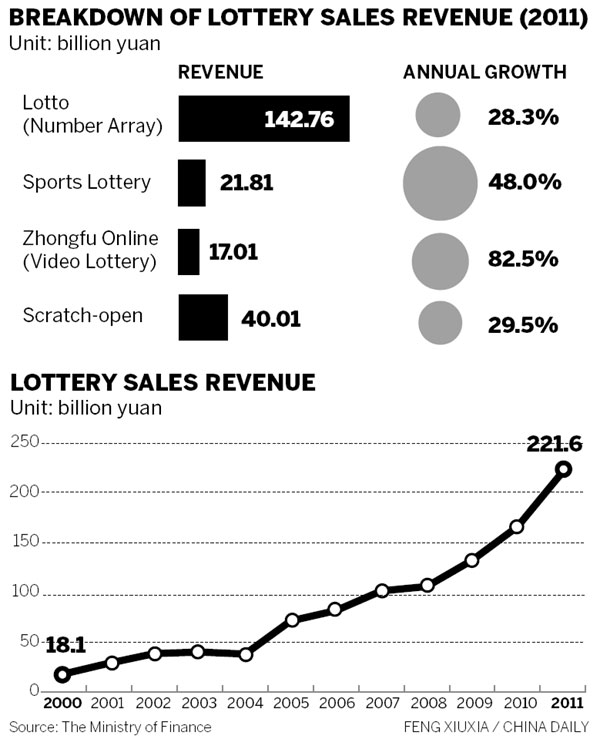Ticket revenue increased 204 billion yuan from the start of the century to 2011
The mercury hit 35 C on the July afternoon in Beijing, cicadas filled the air with their scratching and a heated discussion was taking place among a group of men at a storefront in Xiaoguan community, Beijing.
"I have a feeling that I'm going to get something this time. I've done an AC analysis," said a young fellow wearing slippers.
'No way! Your numbers don't add up. Learn some probability theory," an older man said, swishing his fan.
The earnest attitude, professional terms, along with thickly dotted analytical graphics on the wall and the changing numbers on a plasma screen, had all the hallmarks of a stock exchange.
However, the owner of this local China Welfare Lottery store, who would only give his family name as Zheng, said he had never seen any of them making any decent returns on their "investment".
"But they were indeed more enthusiastic after hearing about the 570 million yuan ($90.5 million) jackpot in Beijing last month," he said.
A survey conducted by the Lottery Research Center "But they were indeed more enthusiastic after hearing about the 570 million yuan ($90.5 million) jackpot in Beijing last month," he said.
A survey conducted by the Lottery Research Center of Beijing Normal University showed that there are more than 200 million lottery ticket buyers in China, of which about 7 million are "problem buyers" who are addicted to the game.
Most of the lottery buyers - 93 percent - are male, and 73 percent of them are aged between 26 and 34. Seventy percent of them earn roughly 3,000 to 5,000 yuan a month.
"A common feature of this group is they may have qualifications, technical skills, families, dreams, budgets, but very little social status," the report said.
According to Zheng's experience, lottery stores are only opened in lower-income communities because people from upscale communities pay little attention to the game. Each lottery store makes a 7 percent commission from sales of lottery tickets.
Although there is a small banner in his store that reads "help the poor", a much bigger poster in a more obvious position marked with the latest prizes won at this betting center is what drives customers in.
"It's all about dreams of quick fortunes. Nobody cares about public welfare," Zheng said.
In the past decade, the lottery industry in China grew even faster than the rampaging economy. Lottery ticket sales increased from 18 billion in 2000 to 220 billion yuan in 2011 - an annual growth rate of nearly 30 percent.
Li Gang, who conducts research into the lottery industry at Shanghai Normal University, said lottery ticket sales this year are expected to exceed 250 billion yuan. However, he doubts the sustainability of this rapid growth.
"Normally speaking, each lottery product has a life cycle of just three to five years. In the constraint of policies, there will be no new products that can be launched in China in the near future," Li said.

